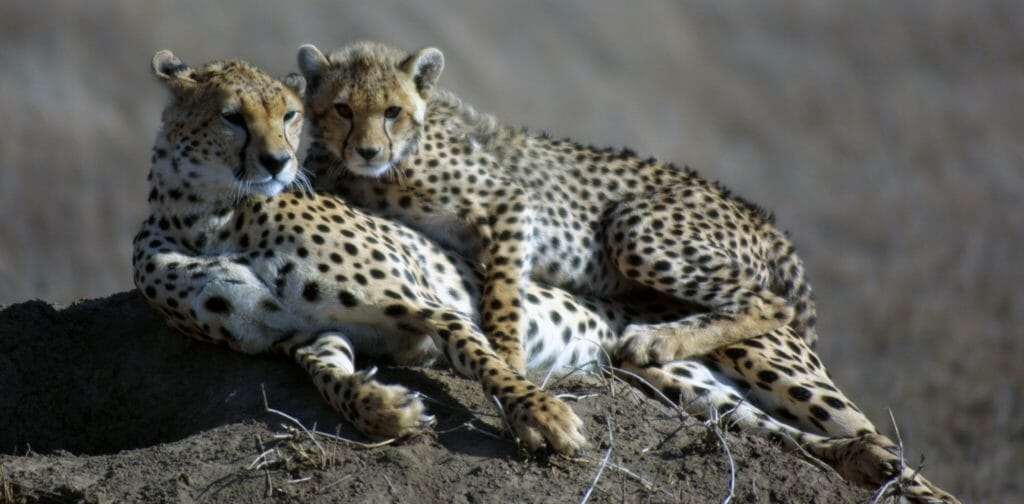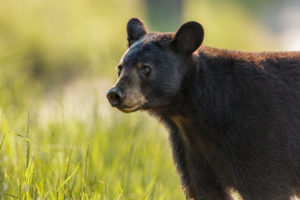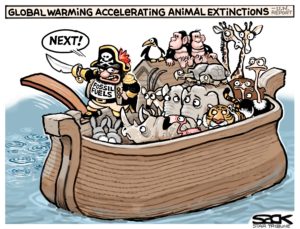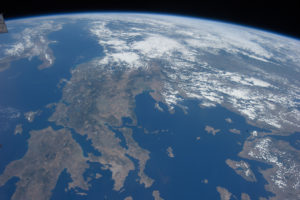Warming Climate Is Driving Species Loss
British researchers study 481 species across the globe to find out how climate change and land-use change interact to affect mammals and birds. The study lists cheetahs as one species affected by rapid climate change. (Zoological Society of London)
The study lists cheetahs as one species affected by rapid climate change. (Zoological Society of London)
The warming climate is driving species loss, say British scientists who have researched how the heating of the planet and changes in land use are affecting wildlife.
Evidence abounds that the Earth’s climate is warming fast – faster than expected. At the same time, the threat of extinction is coming closer to many species. But establishing how the two are linked has so far been problematic.
Now, though, the rate at which the globe is warming has been found to be a critical factor in explaining the decline of birds and mammals, according to research by the Zoological Society of London’s Institute of Zoology published in the journal Global Change Biology.
Best Explanation
The researchers studied 987 populations of 481 species across the globe, to find out how the rate of climate change and land-use change (from natural to human-dominated landscapes) interact to affect the rate of decline of mammals and birds, and also to see whether species’ body size and location in protected areas make any difference.
They conclude that the best explanation for the rate of population declines which scientists are seeing is the rate at which the climate is warming.
The study highlights the black-tailed godwit (Limosa limosa) in Germany and Senegal, pink-footed geese (Anser brachyrhynchus) in Canada, cheetahs (Acinonyx jubatus) in Uganda and black-backed jackals (Canis mesomelas) in Tanzania as among species in decline.
Birds are one of the groups worst affected by rapid climate warming, the researchers say, with effects twice as strong as in mammals. They also find that bird populations living outside protected areas are more severely affected.
In areas where the rate of climate warming is worse, we see more rapid bird and mammal population declines.
The study’s lead author, Fiona Spooner from the Institute of Zoology and the UCL Centre for Biodiversity and Environment Research, said birds might be more vulnerable because their breeding seasons were particularly sensitive to temperature changes.
This could be leading to the loss of a link between their reproduction cycles and stable temperatures. “Mammal breeding seasons are a lot more flexible, and this is reflected in the data”, she said. A recent study found that birds’ unique vulnerabilities can also include their choice of diet.
The finding on avian reproduction patterns is crucial, because if the rate at which the climate warms exceeds animals’ maximum ability to adapt to environmental changes, local extinctions will start to become more prominent. The research stresses the urgency of understanding the vulnerability of animals to temperature increases and offers a snapshot of what may happen if climate change is not slowed.
The study’s senior co-author, Robin Freeman, head of the Indicators and Assessment Unit at the Institute of Zoology, said: “Our research shows that in areas where the rate of climate warming is worse, we see more rapid bird and mammal population declines. Unless we can find ways to reduce future warming, we can expect these declines to be much worse”.
Problem for Today
But he added: “Importantly, our finding does not suggest that human land-use changes, such as for agriculture, development or deforestation, do not play a role in the decline of birds and mammals, or that because the decline is climate change-related, it’s somehow something for future generations to deal with.
“Rather, this finding suggests that additional data, including higher resolution landscape data, is needed to understand the mechanisms driving these declines”.
Gareth Redmond-King, head of climate and energy at WWF-UK, said: “This report provides further evidence of the growing threat that climate change poses to our wildlife, not only around the world but also right here on our doorsteps.
“That’s why we urgently need the UK government to take action to meet current targets to cut greenhouse gas emissions, but also to increase ambition to build a sustainable, climate-resilient future in which we restore nature, not destroy it”. WWF and ZSL jointly publish the Living Planet Index Report every two years.
Your support matters…Independent journalism is under threat and overshadowed by heavily funded mainstream media.
You can help level the playing field. Become a member.
Your tax-deductible contribution keeps us digging beneath the headlines to give you thought-provoking, investigative reporting and analysis that unearths what's really happening- without compromise.
Give today to support our courageous, independent journalists.






You need to be a supporter to comment.
There are currently no responses to this article.
Be the first to respond.